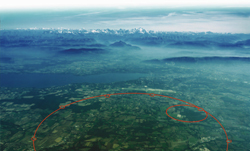Geneva, 14 October 2004. On 19 October, CERN1's 50th anniversary celebrations reach a climax with a ceremony to be attended by Heads of State, along with representatives of the governments of all the Organization's Member States and Observers.
Geneva, 14 October 2004. On 19 October, CERN1's 50th anniversary celebrations reach a climax with a ceremony to be attended by Heads of State, along with representatives of the governments of all the Organization's Member States and Observers.
Journalists are welcome to attend the event, but accreditation is necessary in advance.
Accredited journalists attending the event will have full access to the ceremony, and there will be a fully equipped press centre from which the ceremony can be followed on a big screen. Sound feeds (analogue XLR) will be available in the press centre as well as the main ceremony tent, as well as telephone, fax and Internet access2. Non-accredited journalists will have access to the press centre only.
The programme for the official ceremony (15:00 – 17:00) is as follows:
- Opening address: Dr Robert Aymar, CERN Director General
- Keynote speech: CERN's scientific achievements and their impact on society
Professor Federico Mayor Zaragoza, UNESCO Director General 1987-1999 - Messages from the Heads of State of Switzerland, France and Spain (information correct as of 14 October 2004)
- Closing address: Professor Enzo Iarocci, President of CERN Council
For EBU member broadcasters, the full event will be available live from 14:00 on Eutelsat W3. This will cover the arrival of delegations between 14:00 and 15:00, as well as the ceremony from 15:00 to 17:00.
It may be possible to organise interviews with members of the delegations after the official ceremony. Please communicate your requests to the press office in advance.
Notes for editors:
- A wide selection of images of CERN is available from the Press Office Photo Database and the CERN Photo Database.
- A short film about CERN and its history, in Beta and DVcam, can be obtained from the CERN press office.
- Highlights of CERN history.
CERN was born in 1954 from the vision of a small number of scientists who saw the opportunity not only to build a world-class laboratory for nuclear and particle physics in Europe, but also to bring nations together through science. CERN's founding convention emphasises that the Organization should foster international collaboration and promote contacts between and interchange of scientists. The Organization is also charged with making its results freely available, providing advanced training, and working in close collaboration with other research institutions. "When the 12 founding Member States ratified the CERN convention on 29 September 1954," explains CERN's Director General Robert Aymar, "they gave the new organization a mission to provide first class facilities, to coordinate fundamental research in particle physics, and to help reunite the countries of Europe after two world wars."
In all of these, CERN has succeeded.
Its unique facilities play host to around half the world's particle physicists, its membership has grown to 20 European states, with many countries from beyond the European region also taking part, and its Member States have pooled their resources to make CERN their national laboratory for particle physics. "It is no accident," says Aymar, "that many of the countries about to join the European Union are already members of CERN. Scientific collaboration has proved to be a valuable step on the way to collaboration at the political level."
In the Organization's golden jubilee year, CERN is focusing on the Large Hadron Collider (LHC), which will be the world's largest and most complex scientific instrument when it switches on in 2007. Experiments at the LHC will allow physicists to complete a journey that started with Newton's description of gravity.
Gravity acts on mass, but so far science is unable to explain why the fundamental particles have the masses they have. Experiments at the LHC may provide the answer. LHC experiments will also probe the mysterious missing mass and dark energy of the universe - visible matter seems to account for just 5% of what must exist. They will investigate the reason for nature's preference for matter over antimatter, and they will probe matter as it existed at the very beginning of time.
CERN's reputation is based on fundamental research, but the Organization is also an important source of new technologies. This is particularly true in the area of information technology. The World Wide Web was invented at CERN, and today the Organization is in the vanguard of the effort to develop a globally distributed computing system known as the Grid.
2. Please be aware that there will be no firewall for Internet access in the press centre. In order to run securely and as a courtesy to others, please install Antivirus software, live updates and security patches on your machine before coming. We also encourage you to install your favourite firewall software.

